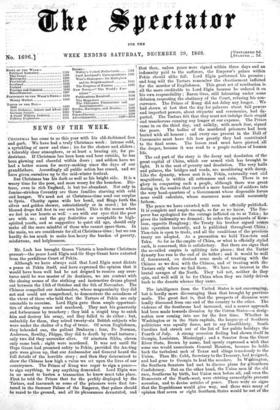. Mr. Loch has brought Queen Victoria a handsome Christmas
present—the peace Lord Elgin and Sir Hope Grant have extorted from the perfidious Court of Pekin.
Although we have always said that Lord Elgin must dictate a peace at Pekin itself, and have expressed the opinion that it would have been well had he not deigned to receive any over- tures until he was master of its destinies, we are content with the closing scenes of the striking and instructive drama played out between the 13th of October and the 9th of November. The Chinese Compelled our Amba:ssador, whose magnanimity they did not and could not comprehend, to demonstrate the soundness of the views of those who held that the Tartars of Pekin are only amenable to coercion. Lord Elgin gave them ample opportuni- ties of showing sense and manhood. They met his generosity and forbearance by treachery ; they laid a stupid trap to catch • him and destroy his army, and they failed to do either ; but, unluckily for them, they seized twenty-six British subjects who were under the shelter of a flag of trace. Of seven Englishmen, they beheaded one, the gallant Brabazon.; four, De Norman, Anderson, Bowlby, Phipps, they did to death by cruel tortures ; only two did they surrender alive. Of nineteen Sikhs, eleven only came back ; eight were murdered. It was not until Sir -Hope Grant had promised safety to Pekin, provided the An-ting gate were given up, that our Ambassador and General heard the lull details of the horrible story ; and then they determined to show the Chinese how high a value we set upon the lives of our countrymen. The Prince of Kling was eager to sign a peace— to sign anything, to pay anything demanded. Lord Elgin was in no mood to hasten a transaction he knew must take place. First he told the Prince that for the perfidy displayed by the Tartars, and inasmuch as some of the prisoners were first tor- tured in the Summer Palace of the Emperor, that palace should be razed to the ground, and all its pleasaunoes devastated, and that then, unless peace were signed within three days and an indemnity paid to the sufferers, the Emperor's palace within Pekin should alike fall. Lord Elgin performed his promise ; and long will the Tartars remember the chastisement inflicted for the murder of Englishmen. This great act of retribution is all the more creditable to Lord Elgin because he ordered it on his own responsibility ; Baron Gros, still labouring under :some delusion respecting the obstinacy of the Court, refusing his con- currence. The Prince of Kung did not delay any, longer. . We hita shown at last that the day for palavers about full powers and imperfect powers, about etiquette and ceremonies, had da.- parted. The Tartars felt that they must not indulge their stupid and treacherous cunning any longer at our expense.' The Prince came in on the third day, and sulkily, with much fear, signed the peace. The bodies of the murdered prisoners had. been. buried with all honour ; and every one present in the Hall of Ceremonies must have felt how greatly they had contributed to the final scene. The lesson read must have Pierced, all the deeper, because it was read to a people reckless of human life.
The sad part of the story is the decay and desolation of the great capital of China, which our armed visit has brought to light. It is the seat of poverty and desolation. The very halls and palaces, the bridges and roads, are mouldering with decay. Like the dynasty, whose seat it is, Pekin, externally vast and magnificent, is within all rottenness and ruin. There is no glory in conquering such a people, although there was great daring in the resolve that carried a mere handful of soldiers into the very head-quarters of a Government whose disposable fermis none could calculate, whose resources none could accurately 'fathom.
The peace we have extorted will soon be officially published. It is complete and ample enough, so far as_we know. - The Em- peror has apologized for the outrage inflicted on us at Taku.; he gives the indemnity we demand ; he cedes the peninsula of KOw- loon, opposite Hongkong ; the Treaty his brother signed e6nies into -operation instantly, and is published throughout China ; Tien-tsin is open to trade, and all the conditions of the previous treaty are adopted. As a precaution we hold Tien-tsin and Taku. So far as the empire of China, or what is officially styled such, is concerned, this is satisfactory. But there are signs that the so-called empire is splitting into pieces ; that the ,Tartar dynasty has run to the end of its tether ; and it would be _well if, forewarned, we devised some mode of treating with the Chinese as we deal with the Chinese and of treating with the Tartars only where we find them. 14lre have no interest in the brutal savages of the North. They toil not, neither do they spin, and well will it be for China when they are fairly driven
back to the deserts whence they came. .


























